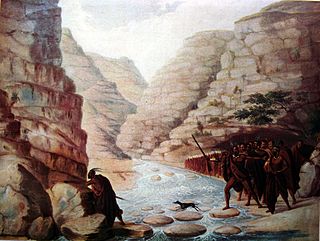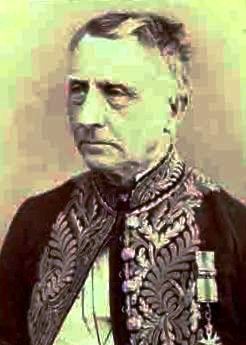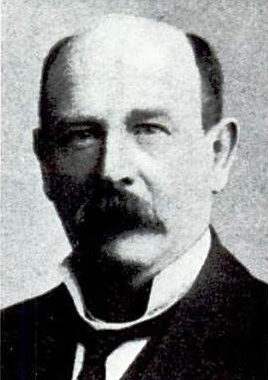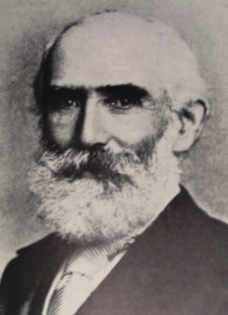Related Research Articles
The year 1870 in the history of the Cape Colony marks the dawn of a new era in South Africa, and it can be said that the development of modern South Africa began on that date. Despite political complications that arose from time to time, progress in Cape Colony continued at a steady pace until the outbreak of the Anglo-Boer Wars in 1899. The discovery of diamonds in the Orange River in 1867 was immediately followed by similar finds in the Vaal River. This led to the rapid occupation and development of huge tracts of the country, which had hitherto been sparsely inhabited. Dutoitspan and Bultfontein diamond mines were discovered in 1870, and in 1871 the even richer mines of Kimberley and De Beers were discovered. These four great deposits of mineral wealth were incredibly productive, and constituted the greatest industrial asset that the Colony possessed.

Sir Henry Bartle Edward Frere, 1st Baronet, was a British colonial administrator. He had a successful career in India, rising to become Governor of Bombay (1862–1867). However, as High Commissioner for Southern Africa (1877–1880), he implemented a set of policies which attempted to impose a British confederation on the region and which led to the overthrow of the Cape Colony's first elected government in 1878 and to a string of regional wars, culminating in the invasion of Zululand (1879) and the First Boer War (1880–1881). The British Prime Minister, Gladstone, recalled Frere to London to face charges of misconduct; Whitehall officially censured Frere for acting recklessly.

Griqualand East, officially known as New Griqualand, was one of four short-lived Griqua states in Southern Africa from the early 1860s until the late 1870s and was located between the Umzimkulu and Kinira Rivers, south of the Sotho Kingdom.

The Cape Mounted Riflemen were South African military units.

The Xhosa Wars were a series of nine wars between the Xhosa Kingdom and the British Empire as well as Trekboers in what is now the Eastern Cape in South Africa. These events were the longest-running military resistance against European colonialism in Africa.

Sir John Gordon Sprigg, was an English-born colonial administrator and politician who served as prime minister of the Cape Colony on four occasions.

Sir John Charles Molteno was a politician and businessman who served as the first Prime Minister of the Cape Colony from 1872 to 1878.

Sir Richard Southey was a British colonial administrator, cabinet minister and landowner in South Africa.

John Fairbairn was a newspaper proprietor, educator, financier and politician of the Cape Colony.
Donald Barkly Molteno, known as Dilizintaba, was a South African parliamentarian, constitutional lawyer, champion of civil rights and a prominent opponent of Apartheid.
Molteno is a town in Lombardy, Italy.

Molteno is a town in the Eastern Cape province of South Africa.

John ("Jock") Paterson was a prominent politician and successful businessman of the Cape Colony, and had a great influence on the development of Port Elizabeth where he was based. He ran newspapers, established the Grey Institute and played a significant role in founding South Africa's Standard Bank.

Jacobus Wilhelmus ("J.W.") Sauer, was a prominent liberal politician of the Cape Colony. He served as Minister in multiple Cape governments, and was influential in several unsuccessful attempts to enshrine equal political rights for black South Africans in the constitution of the Union of South Africa. He was also a strong early supporter of women's rights and suffrage.

Sir Charles Abercrombie Smith was a Cape Colony scientist, politician and civil servant.

Charles Pacalt Brownlee was a politician and writer of the Cape Colony. He was the first Secretary for Native Affairs in the Cape.

John Charles Molteno Jr. M.L.A., was a South African exporter and Member of Parliament.

The Cape Qualified Franchise was the system of non-racial franchise that was adhered to in the Cape Colony, and in the Cape Province in the early years of the Union of South Africa. Qualifications for the right to vote at parliamentary elections were applied equally to all men, regardless of race.

The Parliament of the Cape of Good Hope functioned as the legislature of the Cape Colony, from its founding in 1853, until the creation of the Union of South Africa in 1910, when it was dissolved and the Parliament of South Africa was established. It consisted of the House of Assembly and the legislative council.
Molteni is an Italian surname derived from the town of Molteno near Lecco. It is also common in the Italian diaspora. People with the surname include:
References
- ↑ "Molteni - Origine del Cognome". Nomix.it (in Italian). Retrieved 9 January 2025.